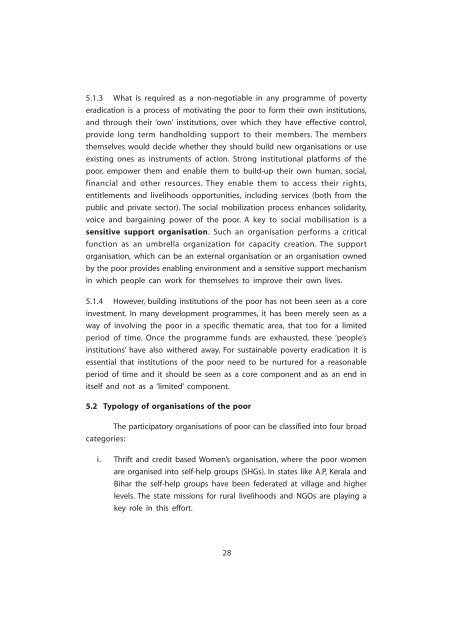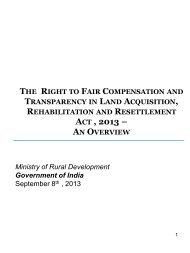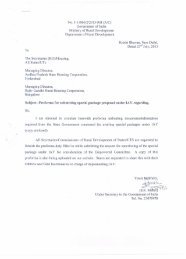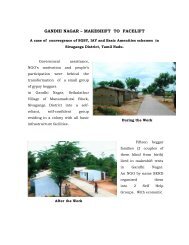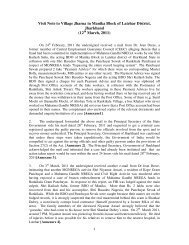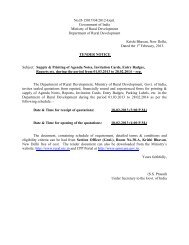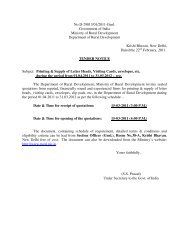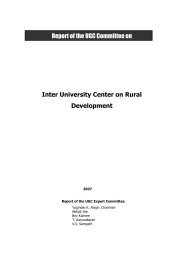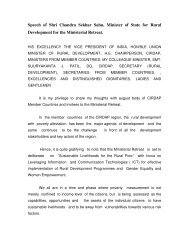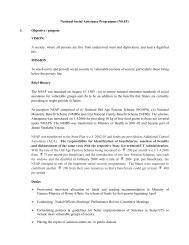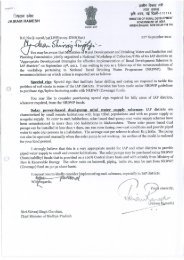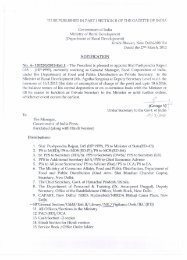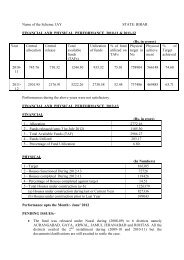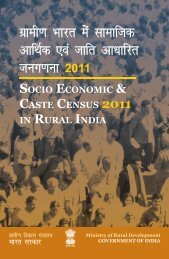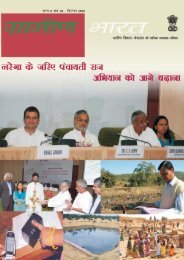Report of the Committee on Restructuring DRDA. - Ministry of Rural ...
Report of the Committee on Restructuring DRDA. - Ministry of Rural ...
Report of the Committee on Restructuring DRDA. - Ministry of Rural ...
You also want an ePaper? Increase the reach of your titles
YUMPU automatically turns print PDFs into web optimized ePapers that Google loves.
5.1.3 What is required as a n<strong>on</strong>-negotiable in any programme <str<strong>on</strong>g>of</str<strong>on</strong>g> poverty<br />
eradicati<strong>on</strong> is a process <str<strong>on</strong>g>of</str<strong>on</strong>g> motivating <str<strong>on</strong>g>the</str<strong>on</strong>g> poor to form <str<strong>on</strong>g>the</str<strong>on</strong>g>ir own instituti<strong>on</strong>s,<br />
and through <str<strong>on</strong>g>the</str<strong>on</strong>g>ir ‘own’ instituti<strong>on</strong>s, over which <str<strong>on</strong>g>the</str<strong>on</strong>g>y have effective c<strong>on</strong>trol,<br />
provide l<strong>on</strong>g term handholding support to <str<strong>on</strong>g>the</str<strong>on</strong>g>ir members. The members<br />
<str<strong>on</strong>g>the</str<strong>on</strong>g>mselves would decide whe<str<strong>on</strong>g>the</str<strong>on</strong>g>r <str<strong>on</strong>g>the</str<strong>on</strong>g>y should build new organisati<strong>on</strong>s or use<br />
existing <strong>on</strong>es as instruments <str<strong>on</strong>g>of</str<strong>on</strong>g> acti<strong>on</strong>. Str<strong>on</strong>g instituti<strong>on</strong>al platforms <str<strong>on</strong>g>of</str<strong>on</strong>g> <str<strong>on</strong>g>the</str<strong>on</strong>g><br />
poor, empower <str<strong>on</strong>g>the</str<strong>on</strong>g>m and enable <str<strong>on</strong>g>the</str<strong>on</strong>g>m to build-up <str<strong>on</strong>g>the</str<strong>on</strong>g>ir own human, social,<br />
financial and o<str<strong>on</strong>g>the</str<strong>on</strong>g>r resources. They enable <str<strong>on</strong>g>the</str<strong>on</strong>g>m to access <str<strong>on</strong>g>the</str<strong>on</strong>g>ir rights,<br />
entitlements and livelihoods opportunities, including services (both from <str<strong>on</strong>g>the</str<strong>on</strong>g><br />
public and private sector). The social mobilizati<strong>on</strong> process enhances solidarity,<br />
voice and bargaining power <str<strong>on</strong>g>of</str<strong>on</strong>g> <str<strong>on</strong>g>the</str<strong>on</strong>g> poor. A key to social mobilisati<strong>on</strong> is a<br />
sensitive support organisati<strong>on</strong>. Such an organisati<strong>on</strong> performs a critical<br />
functi<strong>on</strong> as an umbrella organizati<strong>on</strong> for capacity creati<strong>on</strong>. The support<br />
organisati<strong>on</strong>, which can be an external organisati<strong>on</strong> or an organisati<strong>on</strong> owned<br />
by <str<strong>on</strong>g>the</str<strong>on</strong>g> poor provides enabling envir<strong>on</strong>ment and a sensitive support mechanism<br />
in which people can work for <str<strong>on</strong>g>the</str<strong>on</strong>g>mselves to improve <str<strong>on</strong>g>the</str<strong>on</strong>g>ir own lives.<br />
5.1.4 However, building instituti<strong>on</strong>s <str<strong>on</strong>g>of</str<strong>on</strong>g> <str<strong>on</strong>g>the</str<strong>on</strong>g> poor has not been seen as a core<br />
investment. In many development programmes, it has been merely seen as a<br />
way <str<strong>on</strong>g>of</str<strong>on</strong>g> involving <str<strong>on</strong>g>the</str<strong>on</strong>g> poor in a specific <str<strong>on</strong>g>the</str<strong>on</strong>g>matic area, that too for a limited<br />
period <str<strong>on</strong>g>of</str<strong>on</strong>g> time. Once <str<strong>on</strong>g>the</str<strong>on</strong>g> programme funds are exhausted, <str<strong>on</strong>g>the</str<strong>on</strong>g>se ‘people’s<br />
instituti<strong>on</strong>s’ have also wi<str<strong>on</strong>g>the</str<strong>on</strong>g>red away. For sustainable poverty eradicati<strong>on</strong> it is<br />
essential that instituti<strong>on</strong>s <str<strong>on</strong>g>of</str<strong>on</strong>g> <str<strong>on</strong>g>the</str<strong>on</strong>g> poor need to be nurtured for a reas<strong>on</strong>able<br />
period <str<strong>on</strong>g>of</str<strong>on</strong>g> time and it should be seen as a core comp<strong>on</strong>ent and as an end in<br />
itself and not as a ‘limited’ comp<strong>on</strong>ent.<br />
5.2 Typology <str<strong>on</strong>g>of</str<strong>on</strong>g> organisati<strong>on</strong>s <str<strong>on</strong>g>of</str<strong>on</strong>g> <str<strong>on</strong>g>the</str<strong>on</strong>g> poor<br />
The participatory organisati<strong>on</strong>s <str<strong>on</strong>g>of</str<strong>on</strong>g> poor can be classified into four broad<br />
categories:<br />
i. Thrift and credit based Women’s organisati<strong>on</strong>, where <str<strong>on</strong>g>the</str<strong>on</strong>g> poor women<br />
are organised into self-help groups (SHGs). In states like A.P, Kerala and<br />
Bihar <str<strong>on</strong>g>the</str<strong>on</strong>g> self-help groups have been federated at village and higher<br />
levels. The state missi<strong>on</strong>s for rural livelihoods and NGOs are playing a<br />
key role in this effort.<br />
28


